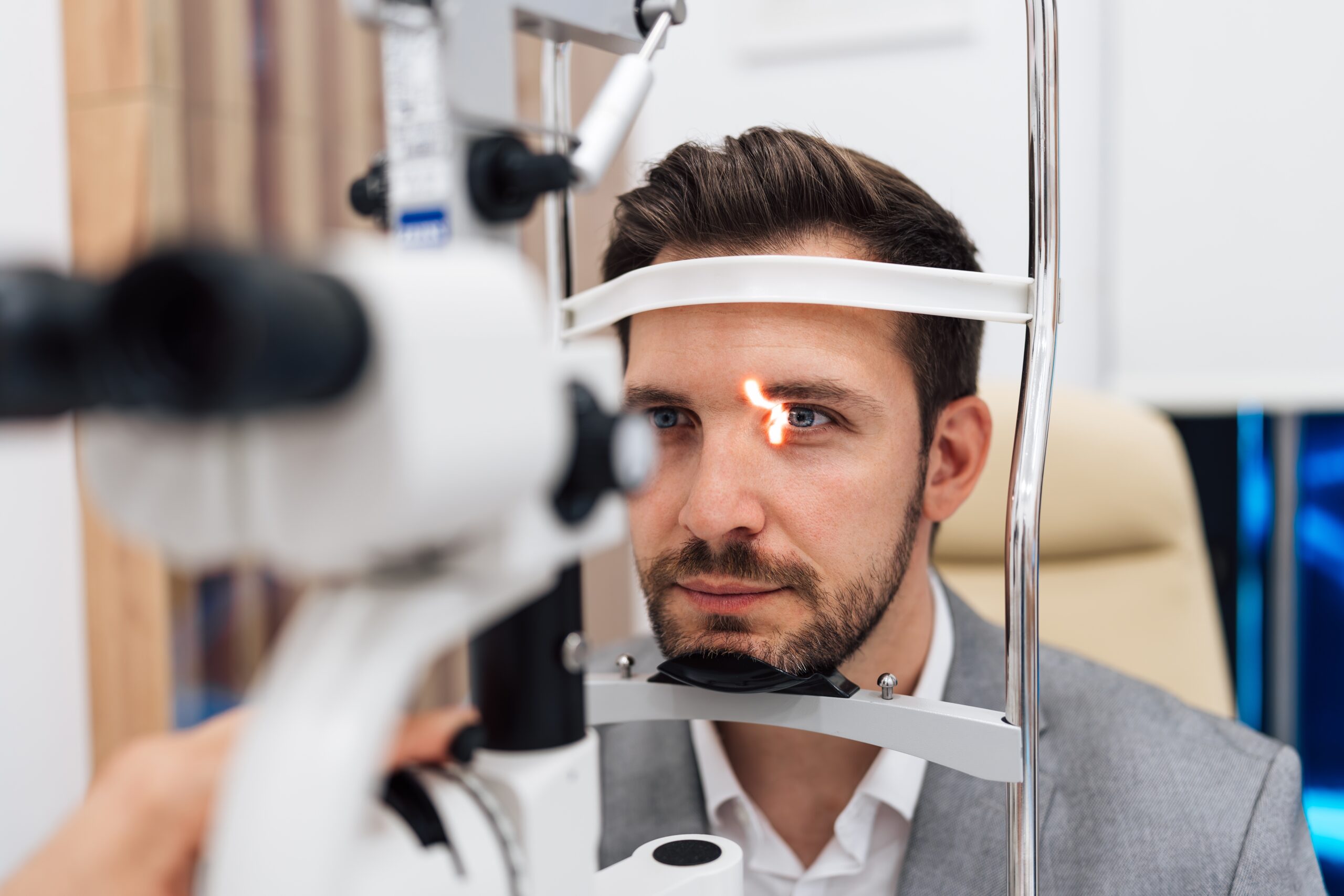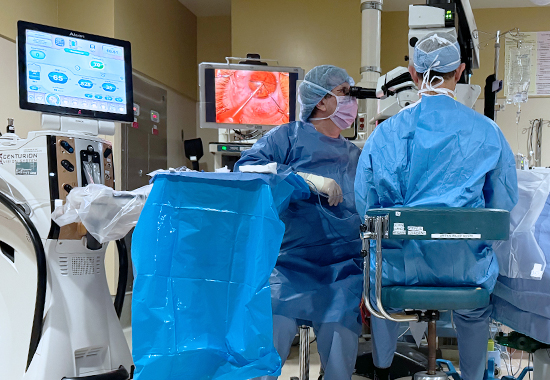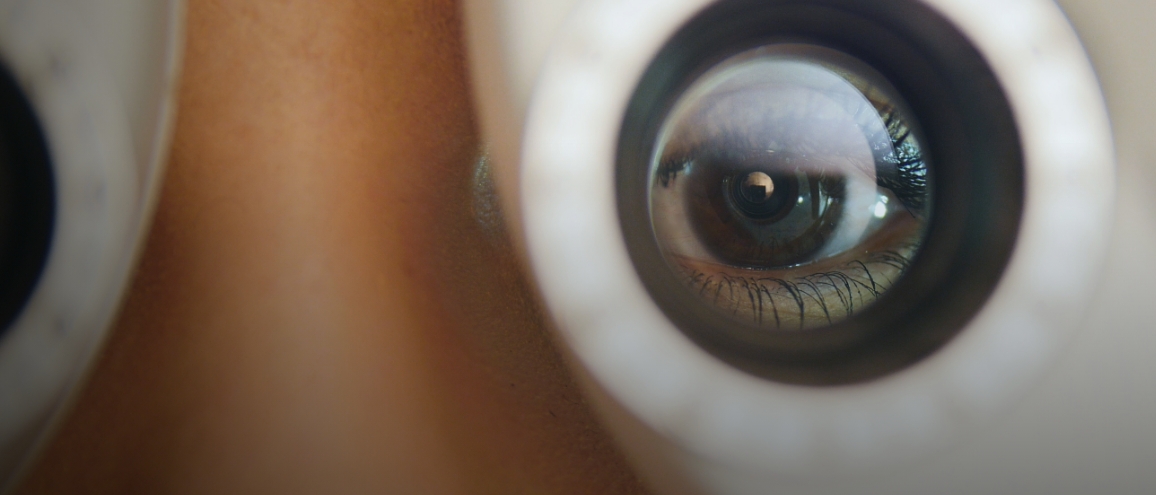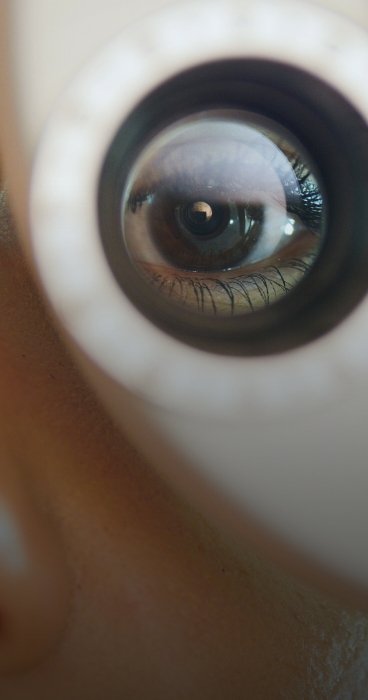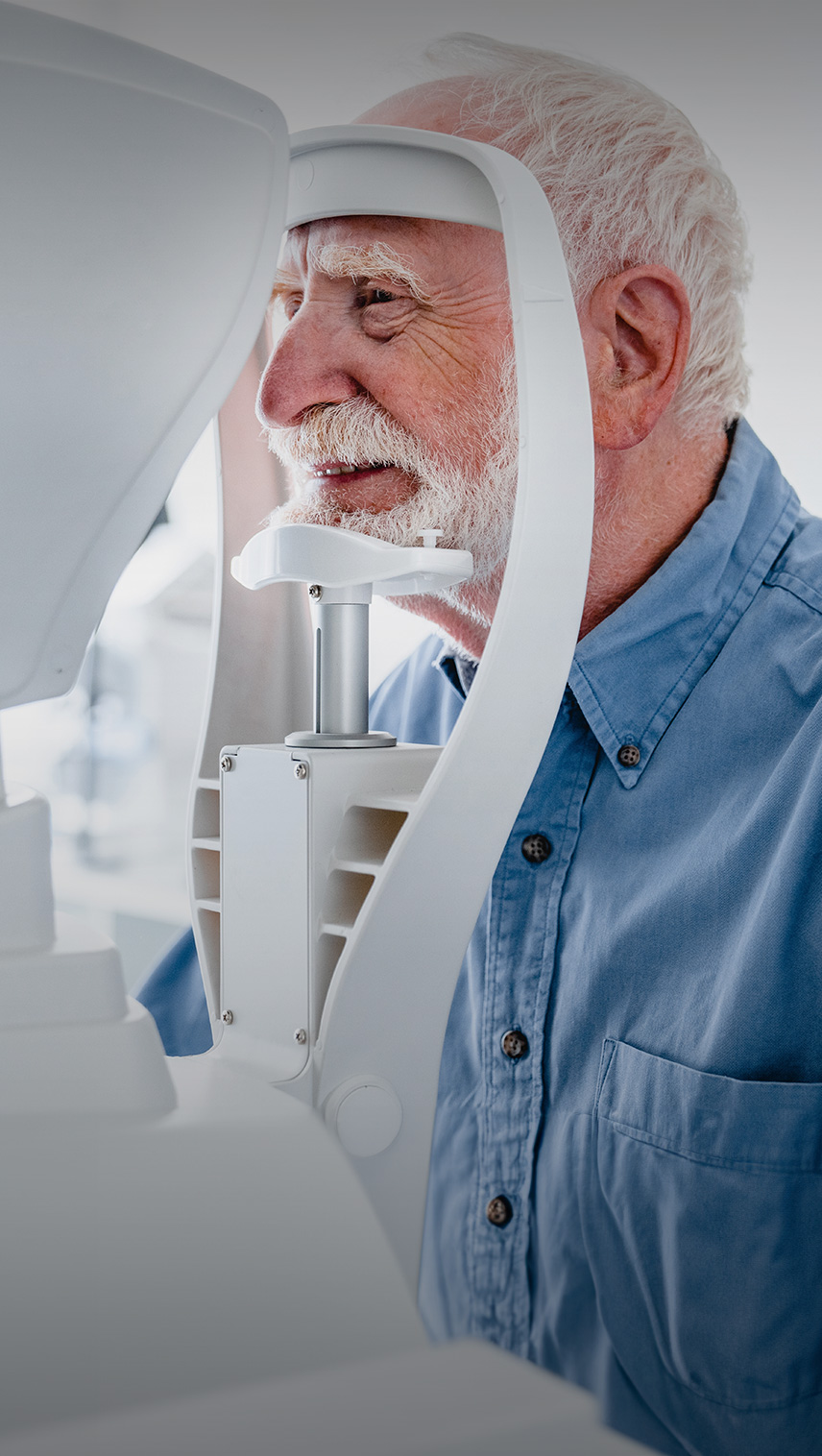At Eye Consultants, we perform a number of more traditional glaucoma surgeries to reduce intraocular pressure and allow fluid to freely flow in the eye.
Trabeculectomy
When medicated eye drops and laser surgery do not remedy intraocular pressure (IOP), your doctor may recommend conventional glaucoma surgery. The most common surgical option is trabeculectomy, also called filtration surgery. During the procedure, your surgeon will create a tiny opening in the sclera (the white part of the eye) covered by a thin trapdoor. The excess aqueous humor (the clear fluid between your eye’s lens and cornea) drains through the trapdoor to a small reservoir just under the eye surface, hidden by the eyelid. This will lower intraocular pressure and slow the effects of glaucoma.
About half of all trabeculectomy patients do not require glaucoma medication for a considerable amount of time after surgery.
While effective at reducing IOP, this procedure is not considered a cure, and people can still experience vision loss even after surgery. It’s important to work with your doctor to create a treatment plan and follow up schedule that is right for you.
Recent News
Advanced Glaucoma Surgery in Wilmington: Preserving Your Vision with Dr. Heather Dealy
Read More
Glaucoma Drainage Device Implants
These devices are designed to route excess fluid from the anterior chamber of the eye to an exterior reservoir using a silicone tube. The GDD is a plate that is hidden under the upper eyelid and is attached to the anterior chamber of the eye using a small silicone tube that enters the eye through a very small hole in the sclera. Although glaucoma drainage devices are extremely effective at controlling internal ocular pressure and have a low risk of surgical failure, many patients still use drops to help control the pressure.
There are a number of different drainage devices or shunts we can use to ensure your eye is draining properly, reduce intraocular pressure, and reduce the risk of vision loss.
Schedule A Consultation
Don’t let glaucoma stop you from living your best life! With our team of eye specialists at Eye Consultants, we’ll ensure you receive the right glaucoma treatment for you. Take the first step and schedule a consultation today. Call our Wilmington, DE office at 302-581-8287 or use our online contact form. We proudly serve the Wilmington, Dover, Townsend, Smyrna, Newark, and Middletown, DE areas.
Frequently Asked Questions
Are you awake during glaucoma surgery?
Glaucoma surgery is usually performed under a local anesthetic with mild IV sedation.
Will glaucoma surgery improve my vision?
While glaucoma surgery doesn’t cure glaucoma or undo existing vision loss, it can help to protect vision and prevent it from worsening.
Who performs glaucoma surgery in Delaware?
Dr. Heather Dealy is a board-certified, experienced ophthalmic surgeon who is dedicated to providing detail-oriented care for her patients. She is fellowship trained in the surgical management of Glaucoma.
Does insurance cover glaucoma surgery?
Glaucoma surgery is covered by most major medical health insurance plans. To learn more about your coverage, please reach out to your insurance provider today.
How much does glaucoma surgery cost?
The cost of glaucoma surgery may vary depending on multiple factors. To learn more about pricing, please contact Eye Consultants today.
How is glaucoma surgery performed?
There are various glaucoma surgery techniques that may be used to lower eye pressure and prevent or reduce damage to the optic nerve. These options may include selective laser trabeculoplasty (SLT), implantation of Durysta™ implant, minimally invasive glaucoma surgery (MIGS), trabeculectomy, tube shunt surgery, or diode laser cyclophotocoagulation. To learn which treatment is best for you and how it is performed, please get in touch with our practice today to schedule a consutlation with Dr. Dealy.
Is glaucoma surgery safe?
When performed by a board-certified ophthalmologist such as Dr. Dealy, risks are greatly reduced. The benefits often outweigh the risks for most advanced glaucoma cases. To discuss candidacy and if this procedure is right for you, please contact our Delaware office today.
What does glaucoma surgery do?
The goal of glaucoma surgery is to reduce pressure in the eye, prevent vision loss, and protect any remaining vision.
What is the recovery of glaucoma surgery like?
Recovery following glaucoma surgery may vary depending on the type of surgery that is performed. Our team will provide you with thorough aftercare instructions to ensure that you heal properly for ideal results.
How long does glaucoma surgery take?
Glaucoma surgery can take anywhere from 15 minutes to 8 2 hours, depending on the type of procedure and the severity of the glaucoma being treated. Dr. Dealy will discuss the specifics of your procedure with you during your consultation appointment.
What are the common side effects of glaucoma surgery?
As with any surgery, glaucoma surgery comes with some side effects. These side effects can include temporary blurriness, eye irritation, redness, and swelling.
Can surgery help reduce or stop the need for glaucoma drops?
Yes, surgery can help reduce or stop the need for glaucoma drops. The surgery works to drain excess fluid and lower intraocular pressure, which makes the drops less necessary.
When can I drive again after glaucoma surgery?
Your eye surgeon will let you know when you can drive again after glaucoma surgery. The exact timing will depend on how well you’re healing and the type of glaucoma surgery used. In general, you will not be able to drive for 1-2 weeks or longer.
What should I avoid after glaucoma surgery to heal properly?
At Eye Consultants, we recommend avoiding heavy lifting and strenuous activities, rubbing or touching your eyes, swimming, and wearing eye makeup. We will give you a full list of things to avoid to ensure you heal properly.
What is a trabeculectomy, and when is it recommended for glaucoma?
Trabeculectomy is a surgical procedure for glaucoma. It creates a new route for the fluid inside the eye to drain and helps relieve pressure. It’s often recommended when other treatments for glaucoma have not worked.
What is a tube shunt (glaucoma drainage device), and when is it used?
A tube shunt is an implant placed inside the eye to lower the intraocular pressure. This creates a new pathway for excess fluid to exit the eye. It’s most often used when medication and other treatments have not worked or when those options are not suitable.
What are the risks or complications of trabeculectomy?
Some of the risks or complications associated with trabeculectomy include bleeding and accidental tears, cataracts, and infection. Low and high intraocular pressure are also possible.
How long does it take to recover after traditional glaucoma surgery?
Most patients need 3-4 weeks to recover after traditional glaucoma surgery. That said, for some patients, it can take up to six weeks for blurred vision to subside. You will likely be able to return to most normal activities within 1-2 weeks, but heavy lifting and strenuous activities should be avoided for longer.
How can scarring affect the success of glaucoma surgery?
Scarring is one of the most common reasons glaucoma surgery fails. It can close off the new drainage system and cause your pressure to increase.
What is a trabeculectomy, and how does it work?
Trabeculectomy is an eye surgery used to treat glaucoma. It helps relieve pressure buildup in the eyes and creates a new way for fluid inside the eye to drain. While it can’t reverse vision loss that has already occurred, it can stop further vision loss and damage.
What determines whether a surgeon chooses trabeculectomy versus a tube shunt?
Your medical history, the severity of your glaucoma, and the results you’re looking for will all help your surgeon determine which procedure is right for you. Both are highly effective treatment options to lower intraocular pressure.
Your medical history, the severity of your glaucoma, and the results you’re looking for will all help your surgeon determine which procedure is right for you. Both are highly effective treatment options to lower intraocular pressure.
Traditional glaucoma surgeries are very successful at lowering eye pressure and slowing the progression of glaucoma over the long term. The exact success rate will depend on the type of procedure used.
Will I need glaucoma medications after surgery?
Whether you need glaucoma medications after surgery will depend on how successful the procedure is. After a successful procedure, you will likely not need glaucoma medications at all.
Dr. Heather Dealy
Board-Certified Ophthalmologist & Glaucoma Specialist
Dr. Dealy is a dedicated and experienced ophthalmic practitioner and surgeon who enjoys taking care of patients and invests particular attention to their surgical care. She began her career in private practice in 2004 in the Wilmington, Delaware community and has been ranked among the Top Physicians in New Castle County in the Delaware Today… Continue reading Dr. Heather Dealy
Read More
“
Real Patient Recommended
”
The service is wonderful, from the receptionists, to the MAs, to the doctors.
The best vision care I have ever received.
Professional, but friendly. Staff, including the doctors, are knowledgeable, ensuring patient understands diagnosis and treatment options.
Next Level
Eye Care &
Cosmetics
Comprehensive Services
From routine eye checks to glaucoma treatment to cataract surgery, our team at Eye Consultants provides a full range of eye care services to ensure each and every patient who walks through our doors receives the top-quality care they deserve.
View All

Comprehensive
Eye Services
Keeping up with your regular eye checkups is important to maintaining healthy eyes and catching any concerns before they turn into issues. Our comprehensive services allow us to monitor your eye health and provide guidance for treatments and maintenance.
Visit Page

Cosmetic
Procedures
Our team also offers cosmetic eye procedures, including blepharoplasty, dermal fillers, and Botox, so patients can simultaneously address their aesthetic concerns and their eye health.
Visit Page
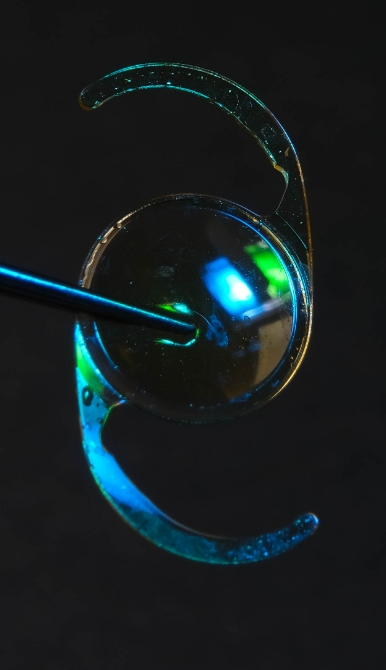
Surgery
If you’ve been diagnosed with cataracts, the only way to have a cataract removed is through surgery. Our surgeons have performed thousands of successful cataract surgeries and will make sure you are fully prepared for your procedure.
Visit Page

Contact Lenses
Properly fitting contact lenses are vital to not only your vision but also your eye health. We’ll help you determine if contact lenses are right for you and ensure your lenses fit so comfortably that you’ll forget they’re there.
Visit Page

Dry Eye
Say goodbye to dry eyes with the help of Eye Consultants! We’ll determine the cause of your dry eyes and build a customized treatment plan to help you finally find the relief you deserve.
Visit Page

Eyewear
Currently at Eye Consultants we offer a full range of refractive services, including determining your glasses prescription. Coming soon in 2025, we will proudly offer optical solutions for our patients who need glasses.
Visit Page


